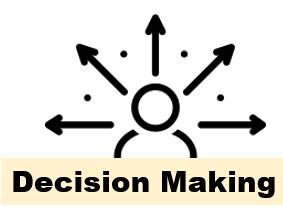Overview
Course Title: Effective Decision Making: Strategies for Success
Course Objective:
The objective of this course is to provide participants with a comprehensive understanding of the decision-making process and equip them with practical strategies, tools, and techniques to make effective decisions in various professional and personal contexts. By the end of the course, participants should be able to:
Understand the fundamentals of decision making and its importance in personal and professional life.
Analyze decision-making styles and identify personal strengths and areas for improvement.
Apply critical thinking skills to gather and evaluate relevant information for decision making.
Utilize decision-making frameworks and models to structure and organize the decision-making process.
Identify and manage common cognitive biases and emotional factors that can impact decision making.
Explore a variety of decision-making tools and techniques to facilitate the decision-making process.
Evaluate the potential risks and benefits associated with different decision alternatives.
Make ethical decisions by considering moral and social implications.
Implement effective decision-making strategies in group settings and manage conflicts.
Develop resilience in decision making and learn from failures to improve future decision-making processes.
Create action plans to implement decisions effectively and monitor their outcomes.
Course Content
Learning Outcome
Course Outline:
Module 1: Introduction to Decision Making
Importance of decision-making in personal and professional contexts
The impact of effective decision-making on outcomes
Common Challenges and barriers in decision making
Module 2: Decision-Making Styles and Self-Awareness
Understanding different decision-making styles
Assessing personal decision-making strengths and weaknesses
Developing self-awareness for improved decision making
Module 3: Critical Thinking and Information Gathering
Developing critical thinking skills for effective decision making
Gathering and evaluating relevant information
Recognizing and addressing information biases and limitations
Module 4: Decision-Making Frameworks and Models
Introduction to decision-making frameworks (e.g., SWOT analysis, cost-benefit analysis)
Decision trees and decision matrices
Applying decision-making models to real-world scenarios
Module 5: Cognitive Biases and Emotional Factors
Identifying common cognitive biases that can influence decision making
Managing emotions and biases in decision making
Enhancing decision-making accuracy and objectivity
Module 6: Decision-Making Tools and Techniques
Brainstorming and ideation techniques
Pareto analysis and prioritization methods
Decision matrices and weighted scoring models
Decision trees and scenario analysis
Six Thinking Hats technique
Cost-effectiveness analysis and financial tools
Module 7: Risk Assessment and Management
Evaluating risks and benefits associated with decision alternatives
Decision making under uncertainty and ambiguity
Strategies for managing risks and minimizing negative outcomes
Module 8: Ethical Decision Making
Considering moral and social implications in decision making
Ethical frameworks and guidelines
Handling ethical dilemmas in decision making
Module 9: Group Decision Making and Conflict Management
Effective decision making in group settings
Facilitating group discussions and consensus building
Managing conflicts and diverse perspectives
Module 10: Resilience and Learning from Failures
Building resilience in decision making
Learning from failures and adapting decision-making strategies
Continuous improvement and reflection
Module 11: Implementing and Evaluating Decisions
Creating action plans for decision implementation
Monitoring and evaluating decision outcomes
Adjusting strategies and making informed revisions

